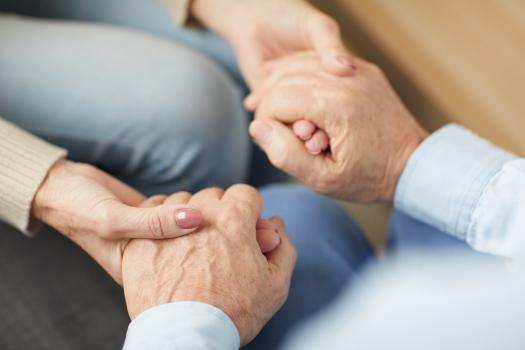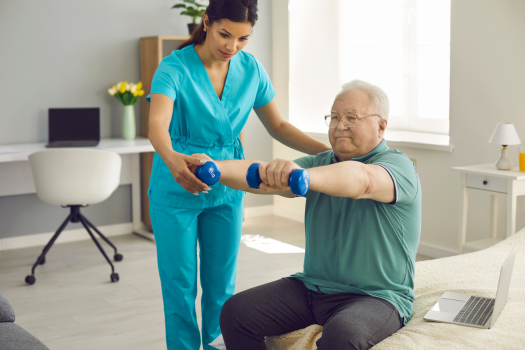
Brain health refers to the capacity to learn, think, reason, and recall information. As seniors age, their brain cells and neural connections decrease, causing cognitive decline. Still, you can delay or minimize this process for your senior loved one. Here are five methods that can help.
1. Serve Your Loved One Foods that Optimize Brain Health
A 2015 study by Rush University found the MIND diet lowers the risk of Alzheimer’s disease. This eating plan emphasizes foods that moderate blood pressure and boost cognitive function. Alzheimer’s & Dementia, the journal of the Alzheimer’s Association, published the research.
The MIND diet incorporates these food groups:
- Whole grains
- Vegetables, including leafy greens
- Fruits, especially berries
- Fish and chicken
- Beans
- Olive oil
- Nuts, either low-sodium or unsalted
Meanwhile, your loved one should avoid eating the following:
- Red meat
- Fried and fast foods
- High-fat cheese
- Stick margarine and butter
These detrimental foods are full of saturated fats, impairing brain functions such as concentration and recall. Also, avoid serving products loaded with salt and sugar. Aim to limit your loved one’s sodium intake to 2,300 mg daily. This amount equals roughly one teaspoon of salt.
Before starting your loved one on the MIND eating plan, get his or her doctor’s consent.
A professional caregiver can ensure your loved one eats healthy meals and enjoys a higher quality of life. Seniors who want to remain healthy as they age can benefit in a variety of ways when they receive professional home care. Assisting Hands Home Care is here to help your loved one accomplish daily tasks, prevent illness, and focus on living a healthier and more fulfilling life.
2. Engage Your Loved One in Mentally Stimulating Activities
Challenging the brain fuels its “cognitive reserve,” its ability to adapt to decreasing brain cells by having well-functioning brain regions compensate for deficient ones. A 2011 study of older adults explored the phenomenon of cognitive reserve and found that seniors who did crossword puzzles sustained their brain function for 2½ years. The research appeared in the Journal of the International Neuropsychological Society.
Bring out the board games. Favorites among seniors are Boggle, Bingo, checkers, Scrabble, and Yahtzee. Various types of puzzles target specific mental operations. For instance, crossword puzzles and word searches enhance verbal memory, while jigsaw puzzles hone working memory and visual-spatial skills. Meanwhile, Sudoku uses short-term recall. Many older adults enjoy playing cards, such as crazy eights, old fish, rummy, and bridge. Reading is mentally stimulating, too.
Seniors experiencing cognitive decline due to conditions such as age-related dementia might need caregivers with special expertise in boosting cognitive health. Aging in place can present a few challenges for seniors living with dementia. However, they can still live independently at home with the help of professional dementia care. Miami families can rely on Assisting Hands Home Care to provide their elderly loved ones with mental and social stimulation, timely medication reminders, assistance with meal prep, and much more. Our caregivers are available around the clock to help your loved one live a happier and healthier life.
3. Try to Keep Your Loved One Physically Active
Exercise has a fantastic effect on brain health. It speeds blood flow, raises glucose metabolism, and creates new neural connections. In 2017, a study by the University of Wisconsin showed moderate physical activity boosts cerebral glucose metabolism. When the brain turns glucose into fuel quickly, learning and recall are easier. The research appeared in the Journal of Alzheimer’s Disease.
Moreover, exercise can prevent cardiovascular disease and stroke. Ideally, your loved one should get 2½ hours of moderate activity per week. Still, it should be enjoyable, not arduous. Examples are walking, dancing, and swimming. Many senior centers offer exercise programs, such as yoga, tai chi, and dance classes.
If your loved one is sedentary, ask his or her doctor for guidance with becoming active.
4. Promote Sound Sleep
A 2019 university study published in Sleep Medicine Clinics found a link between insomnia and cognitive decline. Most seniors need seven to eight hours of sleep every night to function well. During the deep stages of slumber, the brain consolidates and stores memories. Sound sleep also equips the mind to focus, learn, reason, and solve problems. If your loved one has difficulty sleeping, the following tips may help.
First, if your loved one drinks coffee, it’s best to have the last cup at noon. This way, your loved one will eliminate the caffeine by bedtime. Next, your loved one should stop cell phone or computer use 30 minutes before going to bed. Electronic devices emit blue light, hindering the release of melatonin, the hormone that triggers sleep.
Follow a calming bedtime ritual. For instance, play soothing music while your loved one reads or does a crossword puzzle for a few minutes. Then massage your loved one’s hands with lavender lotion. Its relaxing fragrance eases tension and anxiety. Moreover, your caring touch will affirm the bond you and your loved one share.
If it’s noisy outside at bedtime, turn on a white noise machine to mask the sounds. Also, if sunshine awakens your loved one too early, install blackout shades on the windows.
5. Ensure Your Loved One Stays Socially Involved
In 2022, John Hopkins University researchers found isolated seniors are 27 percent more likely to develop dementia than socially active ones. The study appeared in the Journal of the American Geriatrics Society.
Socializing promotes brain health by strengthening neural networks, concentration, and memory. Meanwhile, it staves off depression, another cause of brain shrinkage and cognitive loss. Here are places where your loved one can interact with others:
- Libraries
- Senior centers
- Churches and synagogues
- Community centers
- Gardening and book clubs
Also, invite friends and family members to visit your loved one regularly. Consider creating a rotating schedule. If your loved one can anticipate visitors, it will boost his or her outlook and enjoyment of life.
A trained professional caregiver can be an ideal resource when you’re trying to help your loved one lead a healthier lifestyle. Not every senior has the same care needs, which means they don’t all need the same type of home care service. Miami families can rely on Assisting Hands Home Care to provide individualized care plans to meet their elderly loved ones’ unique care needs. Our caregivers help seniors focus on healthy lifestyle habits such as eating nutritious foods, exercising regularly, and maintaining strong social ties, and we offer mentally stimulating activities that can stave off cognitive decline and delay the onset of dementia. To learn about our quality-assured services, give us a call at (305) 574-9137 today.





